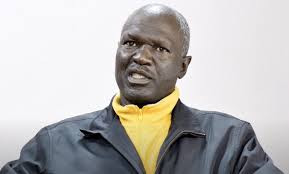BY VANESSA GONYE
Zimbabwe’S marginalised rural communities are fast migrating from donor aid in their quest to withstand climate change shocks and are adopting sustainable development projects.
This seismic transformation is mainly anchored on sustainable agriculture, which aims to achieve the delicate balance between ensuring food security and protection of the environment.
The ever-changing climate had hitherto condemned these communities to aid dependency.
Nowhere is this transformation exemplified better than rural Chiredzi, where smart agriculture champions are emerging from the otherwise arid land from whose deep and rich black earth very little can grow on rainfall alone.
As befitting stuff for a fairy tale, one totally illiterate villager has risen to be the torch bearer, leading the community to a promising future.
Keep Reading
- Chamisa under fire over US$120K donation
- Mavhunga puts DeMbare into Chibuku quarterfinals
- Pension funds bet on Cabora Bassa oilfields
- Councils defy govt fire tender directive
It is the incredible story of 58-year-old Clever Dumela, who spent 15 years hecking through hard earth and intermittent rock formations with his bare hands to reach an aquifer from which he draws water to irrigate sizeable swathes of land.
A farmer in Chiredzi district ward 4, Bandama village, Dumela has also established a thriving fish farming business and currently has over 100 000 fish in his four weirs.
This type of agriculture has been described as equipping farmers to absorb and recover from shocks and stresses to their agricultural production and livelihoods.
Dumela does not care whether he lives to enjoy the fruits of his labour, but is content knowing that he has passed on his farming knowledge to his children, with his second son slowly but surely following in his father’s footsteps.
“I am not educated, but I will rest assured that even if I die, my children will have some skill to fall back on,” he said.
Dumela says he never set his foot in a formal classroom at any level, but has been able to educate his children from the proceeds of his hard labour.
His is a legacy of resilience.
His desire to leave a mark in his family and village has seen him benefiting from a project aimed at equipping farmers in Chiredzi with refined knowledge on resilience agriculture.
His wife, Josephine Nyikayaramba, who has also grasped her husband’s tools of the trade, said it took some time for them to be able to get where they are in terms of resilience agriculture.
“Life has changed, back then we could not afford to earn a reasonable living and to send our children to school,” she said.
“However, we still have challenges with fuel for our water pump, it is our desire to switch to solar energy so as to sustain the project.”
Nyikayaramba acknowledged that her husband was a difficult character to deal with, hence the lengthy period of attaining meaningful results.
An official for the programme which is under the Zimbabwe Resilience Building Fund Enhancing Community Resilience and Sustainability (ZRBF-ECRAS) pointed out that training Dumela was a mammoth task as he was not an easy character to deal with in the quest to ensure that he leaves a legacy.
The climate in Chiredzi used to be harsh for agricultural activities to provide enough to eat but owing to resilience agriculture, boosted by the Zimbabwe Resilience Building Fund (ZRBF), some families are now enjoying its fruits.
The US$100 million-rich ZRBF is supported by the Lands, Agriculture, Fisheries, Water and Rural Resettlement ministry, the European Union, the Swedish embassy, the United Nations Development Programme (UNDP) and the Foreign, Commonwealth and Development Office (FCDO), formerly DFID.
Dumela hopes to one day run a thriving fish business which will go beyond the confines of his village.
His hope is that in the next six months, each kilogramme of fish would fetch him around 50 rand and enable him to do a lot more than he could do 15 years prior.
Dumela’s journey has not been all rosy as he has had to deal with misfortunes and tragedy.
“Security is a major problem here. We once had fish dying as a result of some poisonous plant thrown into the pond by enemies of progress. We lost a lot of fish then and the culprit was never brought to book,” he said.
Dumela admitted that the practice of resilience agriculture was time-consuming and, as such, he endured sleepless nights.
A stone’s throw away is Dumela’s second son’s homestead. Several fish ponds can be seen from outside the gate, proving that the younger Dumela has managed to follow in his father’s footsteps, thereby keeping the family’s legacy alive.
Dumela senior says: “The young man is doing well and this is what I wish for as a father. I will rest assured my family will not suffer when I’m gone. He will surely take over from where I left, helping the family in the process.”
A short distance away is Benson Moyo and his wife Mavis Baye’s homestead.
They, too, are practising resilience agriculture at a large scale.
They have grasped the concept and are living on their venture’s success.
However, it wasn’t all rosy for the seemingly elderly couple.
Their marriage was marred with domestic violence in its formative years and this prompted Baye to look for some kind of reprieve, joining clubs in the process.
She got wind of ZRBF programmes on resilience farming and joined.
It took time for her to knock some sense into her “stubborn” husband, but that did not stop her from working hard.
“We started poultry farming with four road runners and now we have over 300 at any given time,” said Moyo, who has since joined hands with his wife in a thriving road runner production, fish and crop farming ventures.
Notable on their enterprise is the fact that they are doing crossbreeding on broiler chickens with road runners.
Unlike the Dumelas, the Moyos are spreading their wings and have since started a catering business and a shop from proceeds of their resilience farming.
From domestic violence, the Moyos have managed to leave a legacy; a business enterprise and hard work on resilience agriculture for their children and grandchildren.
- Follow Vanessa on Twitter @vanessa_gonye





